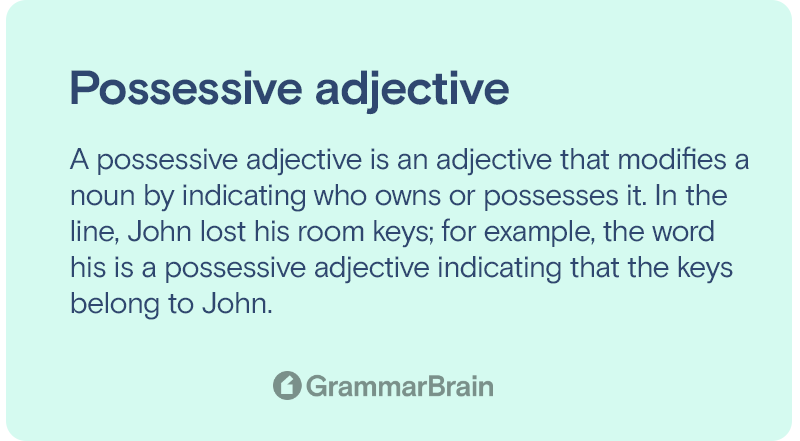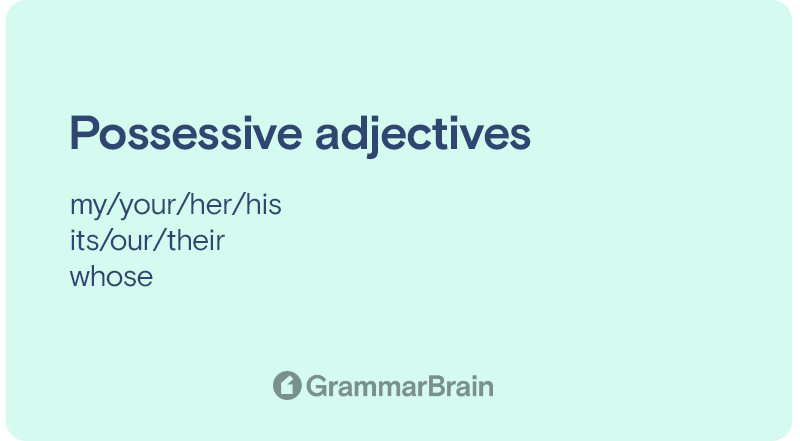What is a possessive adjective? How does a possessive adjective work? Every one of us has a favorite color. Purple could be your favorite color. Orange may be the favorite color of your friend Andrew. Michael, your other buddy, may say that yellow is his favorite color. Or perhaps they agree with you, and both prefer the color purple. Regardless of which color everyone likes, we all have a favorite color.
If you’re familiar with grammar, you’re aware that adjectives are words that modify or characterize pronouns and nouns. In our colorful example above, we used adjectives to describe who preferred a particular color.
We did, however, utilize a specific sort of adjective to express who liked which color: possessive adjectives. So, let’s try to understand this special adjective in a bit more detail.

What is a possessive adjective?
A possessive adjective is an adjective that modifies a noun by indicating who owns or possesses it. In the line, John lost his room keys; for example, the word his is a possessive adjective indicating that the keys belong to John.
“Your, my, her, his, our, it, whose, and their” are the most regularly used possessive adjectives. These adjectives relate to the pronouns: you, I, she, he, it, we, who, and they in that sequence.
| Form | Definition |
| Possessive Adjective | A possessive or ktetic form is a word or grammatical construction used to indicate a relationship of possession in a broad sense. This can include strict ownership, or a number of other types of relation to a greater or lesser degree analogous to it. (Wikipedia) |
Denoting ownership or possession
As the name implies, possess adjectives are frequently used to denote ownership or possession.
For example, the word his is used in the line Reynolds threw his jacket on the chair to indicate that Reynolds owns the jacket.
Possessive adjectives can also be used to allude to symbolic objects that someone possesses, as Maddy explained his vision to me.
Used to describe a person
Possessive adjectives can also be used to describe persons who are connected to something or someone.
For example, the possessive word their is used in the line where Chris and Maria are with their parents.
This conveys that they are linked to Chris and Maria. They do not “possess” their parents but have them.
Choosing a possessive adjective
When settling on a possessive adjective, consider which pronoun you would employ to identify the same individual or thing that possesses or has the noun you are modifying.
As an example:
The mother bird was constructing _____ nest.
The nest should be modified with a possessive adjective in this phrase. The mother bird owns the nest. We would use the word she because the bird is female. Her is the possessive adjective used with she. As a result, our phrase should be as follows:
The mother bird was constructing her nest.
Definition of a possessive adjective
According to the Collins Dictionary, a possessive adjective is “an adjective like Your, my, her, his, our, it and their that expresses what something belongs to or is associated with.” A possessive adjective, according to Merriam-Webster, is “a pronominal adjective denoting possession.”

Possessive adjective list
As mentioned earlier, the possessive adjectives are:
- my
- your
- her
- his
- its
- our
- their
- whose
Possessive adjective vs possessive pronouns
Learning about possessives may be very difficult when first learning the English language’s intricacies.
And this is especially true when learning to distinguish between possessive adjectives and pronouns because they might appear similar!
So, what is the distinction between them? How do you tell them apart? Let us investigate more.
Possessive adjectives
Possessive adjectives, like other adjectives, are used in sentences to describe a noun. Most significantly, they indicate to whom something belongs.
Some of the most prevalent ones include “mine,” “your,” “her,” “his,” and “our.” They should always come before the noun when used.
Let’s look at some instances to understand this in more detail:
- “My favorite color is yellow.”
- “Our vacation has been cancelled.”
- “He ate her supper by accident.”
Another thing to remember is that adjectives do not have plural and singular forms; you can use the same for either!
“Those are my books,” for example, and “this is my book” both employ the same possessive word, “my.”
Possessive pronouns
Possessive pronouns may appear similar to possessive adjectives at first glance. However, they have different connotations and are utilised differently!
While they also demonstrate possession, they can be used instead of a noun in a phrase to avoid repeating it.
Some examples of frequent possessive pronouns are “yours,” “mine,” “hers”, “his,” and “ours.”
As you can see, these are nearly identical to possessive adjectives – with the exception of an extra letter at the end! So, how do they differ in their application?
Possessive pronouns, unlike adjectives, are used after the noun and cannot be used before it.
Consider the following examples:
- “This motorcycle is mine.”
- “The train tickets they stole were actually ours.”
Possessive pronouns, like possessive adjectives, are used in the same way for a plural and singular nouns – there are no alternative forms.
So please don’t get confused because both forms represent ownership. You can use either an adjective or a pronoun in a phrase, but you must be cautious about using the correct structure!
Possessive adjective sentence examples
Examples
- We searched for my dog everywhere, but he was nowhere to be found. (The possessive adjective “my” indicates that the noun dog belongs to me.)
- Their squad was far better than ours. (The possessive words “their” alter the term squad)
- Whose soda is this? (“whose” is the possessive adjective that modifies the noun soda.)
Whose is also an interrogative adjective; therefore, it is frequently used in questions to determine who owns an item.)
How to identify a possessive adjective
The best way to identify a possessive adjective is to look for words like Your, my, her, his, our, it, whose, and their.
Let’s take some examples to understand this in a better way.
Examples:
- Her room is disorganised.
- I’ve always admired their home.
In the above two examples, you will come across the words “her” and “their” that indicate possession or ownership of something. Hence possessive adjectives,
Grammar rules that govern a possessive adjective
When it comes to possessive adjectives, the most important thing to remember is to avoid unintentionally using them as nouns. Possessive adjectives should not be used as objects, subjects, or subject complements. Instead, use a possessive pronoun:
- Incorrect: This luggage is my.
- Correct: This luggage is mine.
- Incorrect: His dog is bigger than your.
- Correct: His dog is bigger than yours, OR His dog is bigger than your dog.
Another thing to remember is that the possessive word “their” might refer to a single individual. Although “their” and “they” are commonly used to refer to many individuals or objects, they may also be used to refer a single person.
Examples
- The banker took their seat.
- Each individual is accountable for their belongings.
The most common mistake individuals make with possessive adjectives is misspelling instead of grammatical faults. The four mistakes listed below are quite common:
Its and it’s: The term it’s is an abbreviation for “it is.”
- The gadget worked until its battery died.
- It’s a beautiful day outside today.
Your and You’re: The word you’re is an abbreviation for “you are.”
- Tomorrow is her wedding anniversary.
- You’re my closest companion.
Whose and Who’s: Who’s is an abbreviation for “who is.”
- Whose car is this?
- Who’s going to accompany me to the store?
There, They’re, and Their: They’re is an abbreviation for “they are.”
There is a popular term with numerous meanings; however, it is not used as a possessive adjective.
- I went to Neil’s place, but he wasn’t there.
- The painters were unable to arrive today, so they’re coming tomorrow.
- My children are completing their schoolwork.
FAQs
What is a possessive adjective?
A possessive adjective is any term used to denote someone’s possession or ownership of something.
What are a few instances of possessive adjectives?
Possessive adjectives include words like her, his, you, their, my, it, and our are instances of possessive adjectives.
What do possessive adjectives mean?
My, your, our, her, his, it, and their are possessive adjectives, also known as possessive determiners.
What are the seven possessive adjectives?
My, our, her, his, it, your, and their are possessive adjectives.
Inside this article
Fact checked:
Content is rigorously reviewed by a team of qualified and experienced fact checkers. Fact checkers review articles for factual accuracy, relevance, and timeliness. Learn more.
Core lessons
Glossary
- Abstract Noun
- Accusative Case
- Anecdote
- Antonym
- Active Sentence
- Adverb
- Adjective
- Allegory
- Alliteration
- Adjective Clause
- Adjective Phrase
- Ampersand
- Anastrophe
- Adverbial Clause
- Appositive Phrase
- Clause
- Compound Adjective
- Complex Sentence
- Compound Words
- Compound Predicate
- Common Noun
- Comparative Adjective
- Comparative and Superlative
- Compound Noun
- Compound Subject
- Compound Sentence
- Copular Verb
- Collective Noun
- Colloquialism
- Conciseness
- Consonance
- Conditional
- Concrete Noun
- Conjunction
- Conjugation
- Conditional Sentence
- Comma Splice
- Correlative Conjunction
- Coordinating Conjunction
- Coordinate Adjective
- Cumulative Adjective
- Dative Case
- Determiner
- Declarative Sentence
- Declarative Statement
- Direct Object Pronoun
- Direct Object
- Diction
- Diphthong
- Dangling Modifier
- Demonstrative Pronoun
- Demonstrative Adjective
- Direct Characterization
- Definite Article
- Doublespeak
- False Dilemma Fallacy
- Future Perfect Progressive
- Future Simple
- Future Perfect Continuous
- Future Perfect
- First Conditional
- Irregular Adjective
- Irregular Verb
- Imperative Sentence
- Indefinite Article
- Intransitive Verb
- Introductory Phrase
- Indefinite Pronoun
- Indirect Characterization
- Interrogative Sentence
- Intensive Pronoun
- Inanimate Object
- Indefinite Tense
- Infinitive Phrase
- Interjection
- Intensifier
- Infinitive
- Indicative Mood
- Participle
- Parallelism
- Prepositional Phrase
- Past Simple Tense
- Past Continuous Tense
- Past Perfect Tense
- Past Progressive Tense
- Present Simple Tense
- Present Perfect Tense
- Personal Pronoun
- Personification
- Persuasive Writing
- Parallel Structure
- Phrasal Verb
- Predicate Adjective
- Predicate Nominative
- Phonetic Language
- Plural Noun
- Punctuation
- Punctuation Marks
- Preposition
- Preposition of Place
- Parts of Speech
- Possessive Adjective
- Possessive Determiner
- Possessive Case
- Possessive Noun
- Proper Adjective
- Proper Noun
- Present Participle
- Prefix
- Predicate



